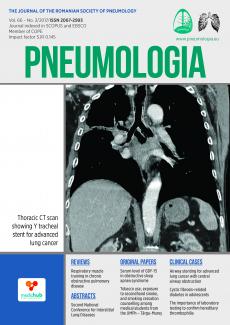RSP activity
With friends at the beginning of the Somnology Conference in the Republic of Moldavia
During the last few years, I participated in all the important medical events in the neighbour country, the Republic of Moldavia. In the last 6 months, these events multiplied as a proof of the evident progress of pneumology in Moldavia. For instance, the bronchology workshop took place not long ago. The last months brought favourable circumstances for a new start in somnology, i.e. a workshop that was organised between the 19th and the 21st of February 2015 in Chisinau, by the Romanian Society of Pneumology, the Somnology and Non-Invasive Ventilation Society, the Pneumology and Allergology section within the "Nicolae Testemiţanu" State University of Medicine and Pharmacy, the "Viaremo" Respiratory Association and the Ftiziopneumology Institute "Chiril Draganiuc".The cornerstone of the workshop was the presence, during the 3 days, of a team of lecturers who, together with pneumology doctors, ENT doctors and neurology doctors from the neighbour country, provided the somnology competence modules 1 and 2 in Romania. In the opening, Dr Oana Deleanu pointed out the steps made in the last almost 20 years in Romania, the obstacles met on the way and the evident limitations and progress during the last years. A group of presentations were given on the following topics: epidemiology of obstructive sleep apnea syndrome, (OSAS), implications of OSAS comorbidities and the OSAS treatment in general (Fl.Mihălţan). On the first day, the following topics were also dealt with: the role of oximetry and polygraphy in detecting and monitoring the disease (St Dumitrache Rujinski) and the recognition of types of events from hipoapnea to obstructive, central or mixed apnea (Lavinia Davidescu). The afternoon was allotted for the first practical exercises, namely anamnesis exercises and exercises to install polygraphs, in work groups of 3-4 doctors. All these exercises were followed by the data unloading test and the data correction upon reading.
The second day started with a presentation of the overlap between OSAS and the obstructive respiratory pathology (Al. Corlateanu). Then, the parasomnia topic (Daniela Boisteanu), the neurogenic hyperventilation topic (Ion Moldovanu) and the collection of data about the sleep behaviour topic (Daniela Boisteanu) were approached. The workshop continued with discussion in detail about the physiopathological mechanism in sleep apnea and the related risk factors, and the OSAS objective examination (Dorina Todea). The presentation on the prediction scores in the sleep syndrome (St. Mihaicuta, M. Udrescu) was also very important. Another chapter that could not be absent on the conference agenda was insomnia, restless leg syndrome and heart rhythm problems (Oana Deleanu). The passage to the practical afternoon workshop was made by presenting complementary topics such as: the use of somnolence questionnaires (St. Mihăicuţă), the central sleep apnea syndrome and the Cheyne Stokes respiration (Oana Deleanu), polysomnography (Oana Deleanu) and the positive airway pressure titration (APAP; CPAP) (St Dumitrache Rujinski). The practical exercises on that day were mainly focused on: the elaboration of a correct epicrisis and the installation of an APAP polygraph. The participants were extremely interested and enthusiastic after the exercises in small groups. The practical exercises on the last day consisted of trying, together with the participants in the workshop, to unload data and validate routes. As for the theory, the following topics were discussed: respiratory sleep disturbances in children (Mihaela Oros), standard procedures in the somnology lab (St. Mihăicuţă) and setting up and equipping a sleep lab (Lavinia Davidescu). The sleep latency tests and wake tests were not omitted (St.Mihăicuţă). In the end, a patient's case from the Republic of Moldavia was analysed with all the diagnostic issues (Victoria Sircu).
The participation of more than 300 Moldovan fellows in the theoretical discussions and of 70 colleagues in the workshops proves the interest shown in this country for somnology and stimulates us to renew the experience. We are grateful to the Moldavian team who, as local organisers, thanks to Prof. V. Botnaru and Lecturer Al.Corlăteanu, created the perfect environment for the conference.




 With friends at the beginning of the Somnology Conference in the Republic of Moldavia
With friends at the beginning of the Somnology Conference in the Republic of Moldavia